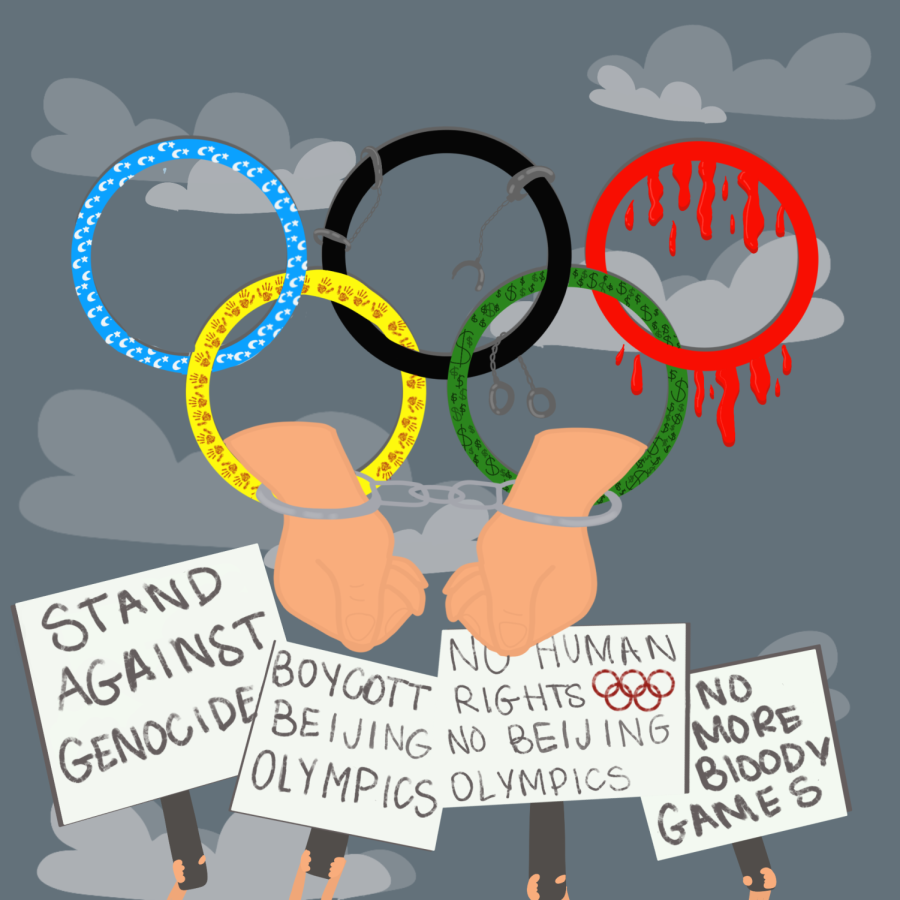The Olympics: Why should you care?
There has not been an international sporting competition in recent memory with so much of the conversation not on the games. With the 2022 World Cup in Qatar a few months away, this conversation will not go away.
February 15, 2022
Do you remember that sporting event that comes around every four years? There are usually summer and winter versions. You know, the one that nations seek to host years in advance, sink colossal amounts of money into and find some type of way to be steeped in controversy? Yes, the Olympics.
I have to be honest, it is nice to see some of the events every so often, but I just cannot seem to reciprocate the sense of unity that the Olympics are meant to generate. There are far too many things that have bled their way into the Olympics –– things that often warp the image of strength and unity the Olympics hope to personify.
Currently, the Winter Olympics are underway in Beijing, China –– the country also hosted the Summer Olympics in 2008 –– and have already generated buzz. Kamila Valieva, a 15-year-old Russian figure skater, tested positive for a banned heart medication in December, though it was not reported until Tuesday after she helped lead the Russian team to a gold medal. Olympic officials have allowed Valieva to compete; however, medals will be withheld from all athletes should Valieva place in the top three. This is yet another notch in the ever-growing list of evidence toward the Russian team –– now called the Russian Olympic Committee –– allowing their athletes to use performance-enhancing drugs in a year-long doping scheme.
Perhaps one of the more sinister occurrences has been China’s human rights violations. Far too often are these sporting events marred in tragedy and human rights concerns. The treatment of the Uyghur population in the Xinjiang province is despicable. China has been accused of detaining over one million Uyghurs, forcing them into hard labor, sexual abuse, torture and what many call “re-education camps.” The Chinese government denies any wrongdoing, simply referring to the camps as means to “combat separatism and Islamist militancy,” according to the BBC. The reported cultural genocide toward the Uyghurs is appalling and the decision to allow China to host the Games cannot, under any circumstance, be a means to allow the country to cover up their horrific abuses. From the treatment of protesters in Hong Kong to the development of surveillance technologies, the International Olympic Committee (IOC) –– the governing body of the Olympics –– needs to consider the weight of their decisions. Though, it will be no surprise if that is not the case. The IOC has made its stance clear on peaceful protesting. I cannot help to think back to the moment sprinters Tommie Smith and John Carlos raised their fists in the air from atop the medal podium in protest for the treatment of Black Americans, and the innocent murder of nearly 300 Mexican students days before the 1968 Olympics began in Mexico City.
For all the negativity, vitriol and international controversies, there are still moments I will never forget. Events like the 1980 miracle on ice –– depicted in the 2004 film “Miracle” –– which found the U.S. men’s hockey team defeating the Soviet Union, 4-3. Record holders such as Michael Phelps, or the resiliency of the U.S. women’s gymnastics team in London in 2012 and Tokyo in 2020. Moments like long-distance sprinters Abbey Cooper and Nikki Hamblin helping one another across the finish line in 2016 at the Rio Games. And more recently, high jumpers Mutaz Essa Barshim and Gianmarco Tamberi sharing a gold medal.
The Olympics have clearly stood the test of time, even despite the impacts of the COVID-19 pandemic. Though, when the nations leave and life is brought back to normal, what really happens? Where do the impoverished people whose homes were leveled for luxurious suites for athletes go? Where do the venues and structures built for the Games go? Is any source of prosperity ingrained into the nation’s economy? In the years before the onset of the pandemic, host nations would see an increase in jobs for the events, tourism and trade. Though, far too often, the negatives outweigh the positives.
You can find more information on the treatment of Uyghurs in China on this podcast from Slate.










